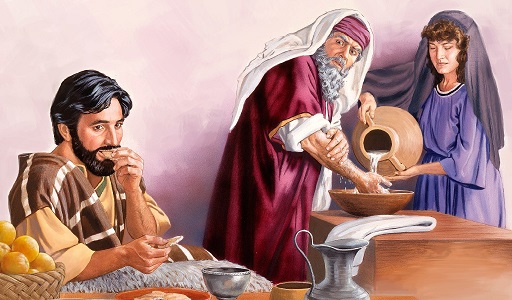Jesus & the Oral Law – taming the traditions … (10/21/18)
While it is true that Matthew 5:17-18 seems to refer to the written “Law and prophets” of the Hebrew Bible of the day, it bears noting that Jewish culture at the time gave almost equal honor to the oral commentaries on the Law (made by Jewish rabbinical leaders at the time, and later written down as the Mishnah some 150+ years after the death of Jesus) and the legal traditions of the Pharisees that were promulgated therefrom. Without much surprise, Jesus spoke about these commentaries & traditions in the Gospels; doing so in much the same way he did on the written Law and its “prophets” – that is to say, critically and reformatively (see Mark 7:6-8‘s “Isaiah prophesied rightly about you hypocrites, as it is written: ‘This people honors me with their lips, but their hearts are far from me. In vain do they worship me, teaching their human precepts as [though it were] legal doctrine.’ Indeed, you abandon the [true] commandments of God and hold to human traditions instead.” – also Matthew 15:3-9). Consider the following three additional examples thereof …
*Even though the Law of Moses only required one ritualized fasting to be made by the Jews1 (see Leviticus 23:26-32 – called “the fast” in Acts 27:9), the Pharisees & other Jewish religious leaders of Jesus’ day had adopted strict and somewhat complicated legal regulations regarding fasting (see Mishnah Taanit 1:4-7, Mishnah Taanit 2:6-10, Mishnah Taanit 3:1-9, & Mishnah Taanit 4:3 et al); petty rules Jesus boldly ignored (see Matthew 9:14-15, Mark 2:18-22, & Luke 5:33-39) and against which he openly protested (essentially calling for fasts to be performed privately & personally instead of publicly & religiously – see Matthew 4:1-10 & Matthew 6:16-18).
*While the Law did indeed require that no one perform work on the Sabbath (the Hebrew melakah, Strong’s #4399 – see Exodus 20:8-10 & Deuteronomy 5:12-14; also Genesis 2:2-3) and though many of “the prophets” also upheld this particular prohibition in their writings (see Isaiah 56:2, Jeremiah 17:22-25, Ezekiel 20:19-20, Amos 8:3-5, & Nehemiah 10:30-31 et al), there was great debate amongst the Jewish religious authorities thereafter as to what actions or deeds qualified as said prohibited “work.” Eventually the rabbis came to agree on 39 activities that were expressly forbidden on that day (all of which related directly or indirectly to the creating mentioned in Genesis 2 – see Mishnah Shabbat 7:2), two of which being reaping & winnowing – both activities which Jesus expressly & publicly allowed his disciples to perform (see Matthew 12:1-8, Mark 2:23-28, & Luke 6:1-5).
*Finally, while the Law nowhere required the washing of hands before eating, the Pharisees had made this as a legal requirement in Jesus’ day (see Mishnah Yadayim 1:1-5 & Mishnah Yadayim 2:1-4 – also Orach Chaim 158:1-2). While such an edict was indeed a prudent one2, Jesus took open exception to the Pharisees making the same legally binding by boldly & openly allowing his disciples to ignore it (see Matthew 15:1-9, Mark 7:1-13, & Luke 11:37-41).

“We all clean many things as we go through life – and yet for the most part most of us do so in futility. We clean our clothes and yet wear them over unclean hearts. We wash our hands and yet leave our souls untouched. We pour water over our heads and it cleans the dirt from our skin as it drips to our feet, and yet we leave our thoughts and our words and our deeds for our fellow man fully removed from that renewed pristinity … Indeed, even the cleanest of maids & housekeepers often show an exquisite ability for making cleanliness more disquieting than the dirt they wash away. And just as cleanliness is indeed next to godliness, many do the very same by their religion; purifying their outward appearance while leaving their thoughts & intentions submerged in the filth of superficiality & the sludge of self-indulgence.” ~ inspired by Nesta Jojoe Erskine & Charles Dickens

………………………………………………………………………
1 It is true as well that fasting is mentioned once in “the prophets” (see Zechariah 7:1-19) – a passage the Jews used to mandate four additional annual fasts: the fast of the 4th month that commemorated the breaking of the tablets recorded in Exodus 32:19 (&/or the famine mentioned in Jeremiah 52:6-7), the fast of the 5th month that commemorated the sacking of the Temple described in Jeremiah 52:12-13, the fast of the 7th month that commemorated the murder of Gedaliah mentioned in Jeremiah 4:1-2, and the fast of the 10th month that commemorated the beginning of the siege of Nebuchadnezzar recorded in Jeremiah 52:4. Other less important ceremonial fasts were also mentioned as being held for various reasons (see Esther 4:16, 1 Samuel 7:6, 2 Chronicles 20:3, Jeremiah 36:6-10, & Nehemiah 9:1 et al), and yet all of these were also public & highly ritualized affairs – calling forth the same critique Jesus espoused in Matthew 6.
2 The near-Eastern method of eating without the use of utensils made a pre-meal washing of the hands sensical at the very least. Of course, as evidenced by his focus on their hypocrisy in challenging such a transgression, Jesus was not decrying the washing of hands as much as he was denouncing the Pharisees egotistically altering the rule of Law.




 ;
;